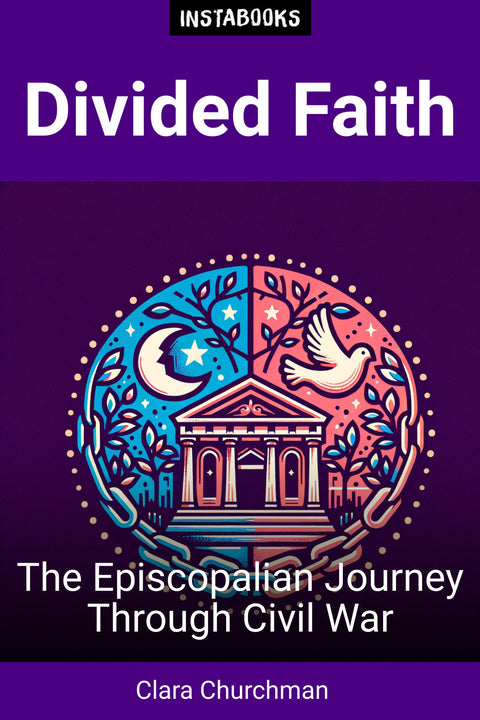
Divided Faith
The Episcopalian Journey Through Civil War
Included:
✓ 200+ Page AI-Generated Book
✓ ePub eBook File — read on Kindle & Apple Books
✓ PDF Print File (Easy Printing)
✓ Word DOCX File (Easy Editing)
✓ Hi-Res Print-Ready Book Cover (No Logo Watermark)
✓ Full Commercial Use Rights — keep 100% of royalties
✓ Publish under your own Author Name
✓ Sell on Amazon KDP, IngramSpark, Lulu, Blurb & Gumroad to millions of readers worldwide
Introduction
In a time when the fabric of America was torn apart by the Civil War, the role of the Episcopalian Church stands out as a complex and often contradictory narrative. This book delves deep into the history of the formation of the Protestant Episcopal Church in the Confederate States, exploring the religious community's intertwining with issues of slavery, segregation, and its ongoing quest for racial reconciliation.
Formation of the Protestant Episcopal Church
The Protestant Episcopal Church in the Confederate States was born out of a tumultuous time in American history. In 1861, Southern dioceses severed ties with the Union and sought to create a distinct identity within the church that represented their Confederate ideals. This sacrifice of unity for a newfound identity was foundational yet fraught with challenges, probing the conflicting values of community and division.
Involvement in Slavery
During its formation, many within the church actively justified slavery, framing it as a mere political issue rather than a moral failing. The pastoral letters from Confederate bishops provide a window into the complex theological justifications used to support an institution that would continue to haunt the nation long after the war ended.
Racial Inclusion and Segregation
After the war, the struggle for racial inclusion within the church revealed deep-seated issues. Despite the formal ending of slavery, many African Americans in the Episcopal faith faced systemic barriers that led to their separation from white congregations. This book examines the discriminatory practices that persisted long after the Civil War ended and the responses of various factions within the church.
Efforts for Reunion
As the nation sought to heal, so too did the fractured church. The reunification efforts of Southern and Northern bishops embody a narrative of forgiveness and understanding. Through conferences and resolutions, these leaders strived to restore peace and unity within their ranks, demonstrating the potential for reconciliation even in the wake of deep divisions.
Lasting Legacy and Contemporary Discussions
The book concludes by connecting historical discourse to the contemporary landscape of the Episcopal Church. Issues of race and inclusion continue to resonate within the church, as they grapple with the legacy of their past. With commitments towards racial reconciliation, the church acknowledges its history while striving towards a more inclusive future. The ongoing conversations surrounding race within the church are a testament to the complexities of faith in the face of societal challenges.
Why This Book Matters
By examining the intersection of faith, society, and history, this book goes beyond mere recounting of events to explore the implications of these histories on present-day discussions about race, inclusion, and reconciliation. It is a vital read for those who seek to understand the intricacies of the Episcopalian Church’s past and its role in shaping current dialogues on race and identity.
Table of Contents
1. The Birth of Division- Southern Secession and the Church
- Establishment of the Confederate Episcopal Church
- The First General Council and its Impact
2. Slaveholding Christianity
- Biblical Justifications for Slavery
- Political versus Moral Perspectives on Slavery
- Role of Bishops in the Slave System
3. Post-War Racial Realities
- Emergence of African American Episcopals
- Challenges in Clergy Ordination
- Dynamics of Racial Segregation in the Church
4. Reunification of the Episcopal Church
- Conferences Between Southern and Northern Bishops
- The 1865 General Convention
- Restoration of Unity: A Historical Examination
5. The Struggle for Racial Inclusion
- Colored Convocations and Their Implications
- The Exodus of Black Episcopalians
- Efforts Towards Inclusivity and Change
6. Legacy of the Episcopalian Church
- Historical Reflections on Slavery and Racism
- Contemporary Discussions on Race in the Church
- The Church's Path Toward Racial Reconciliation
7. Faith Amidst Turmoil
- The Church’s Response to Civil Unrest
- Faith and Political Activism during the War
- The Role of Spirituality in Healing
8. Theological Debates
- Interpretation of Scripture and Social Issues
- Ethics in the Context of War
- Righteousness and the Confederate Cause
9. The Church and the Community
- Support Structures for Soldiers and Families
- Community Gatherings and Their Importance
- Impact of the War on Church Leaders
10. Historical Commemorations
- Memorializing the Past
- Influence on Future Generations
- The Role of Remembrance in Healing
11. A New Chapter in History
- The Church’s Post-War Transformation
- Emerging Leaders and Inclusive Movements
- Lessons Learned from the Past
12. The Future of the Episcopal Church
- Contemporary Challenges in the Faith Community
- Ongoing Commitments to Inclusion
- Paths Forward for Racial Reconciliation
Target Audience
This book is written for scholars, students, and anyone interested in the intersection of faith, history, and social justice, particularly within the context of the Episcopalian Church during and after the Civil War.
Key Takeaways
- Understanding the origins and complexities of the Protestant Episcopal Church in the Confederate States.
- Insight into the church's role in justifying slavery and perpetuating segregation.
- Examination of the reconciliation efforts between Northern and Southern Episcopalians after the Civil War.
- Awareness of the church's ongoing journey towards racial inclusion and reconciliation in the present day.
